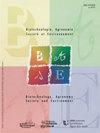行为金融学:人格轨迹与行为偏差的关系
IF 0.6
4区 农林科学
Q3 AGRONOMY
Biotechnologie Agronomie Societe et Environnement
Pub Date : 2018-02-10
DOI:10.4013/BASE.2018.151.02
引用次数: 4
摘要
风险决策研究是基于期望效用理论的。然而,来自行为金融的经验证据表明,个人在决策过程中存在偏见,因此决策并不总是旨在优化财富。为了促进这一主题的发展,本研究分析了174名巴西研究生的人格特征与行为偏见之间的关系。研究结果表明,两种人格特征(尽责性和和蔼可亲)与“概率误解”的偏倚存在显著正相关,而只有尽责性特征与框架的偏倚有关。本研究的另一个相关观察结果是,教学程度(硕士或博士)与所分析的偏见无关,这表明这些偏见独立于个人的研究生水平。这些结果,除了与主题的发展合作外,还有助于投资者意识到他们的个人特征使他们更容易受到启发(心理捷径)的影响。关键词:有限原理,前景理论,判断启发式,决策偏差。本文章由计算机程序翻译,如有差异,请以英文原文为准。
Behavioral Finance: The Relationship Between Personality Traces And Behavioral Biases
Studies on risk decision making were based on Expected Utility Theory (TUE). However, empirical evidence from behavioral finance has shown that individuals commit biases in the decision- -making process, so that decisions are not always aimed at optimizing wealth. Aiming to contribute to the development of this theme, this research analyzed the relationship between personality traits and behavioral biases from a near-experiment with 174 Brazilian postgraduate students. The results of the research indicate that two personality traits (conscientiousness and affability) have a significant and positive relationship with the bias ‘misconception of probability’, while only the trait of conscientiousness was related to the bias of the framework. Another relevant observation of this study is that the degree of instruction (masters or doctorates) was not related to the biases analyzed, indicating that these occur independently from the postgraduate level of the individuals. These results, in addition to collaborating with the development of the topic, are useful for investors to be aware that their personal characteristics make them more susceptible to heuristics (mental shortcuts). Keywords: limited rationale, Theory of Prospects, heuristics of judgment, decision biases.
求助全文
通过发布文献求助,成功后即可免费获取论文全文。
去求助
来源期刊

Biotechnologie Agronomie Societe et Environnement
AGRONOMY-ENVIRONMENTAL SCIENCES
CiteScore
1.60
自引率
0.00%
发文量
12
审稿时长
6-12 weeks
期刊介绍:
BASE publishes original papers in the fields of life sciences: environmental science and technology, forest and natural space management, agronomical science, and chemistry and bio-industries.
 求助内容:
求助内容: 应助结果提醒方式:
应助结果提醒方式:


